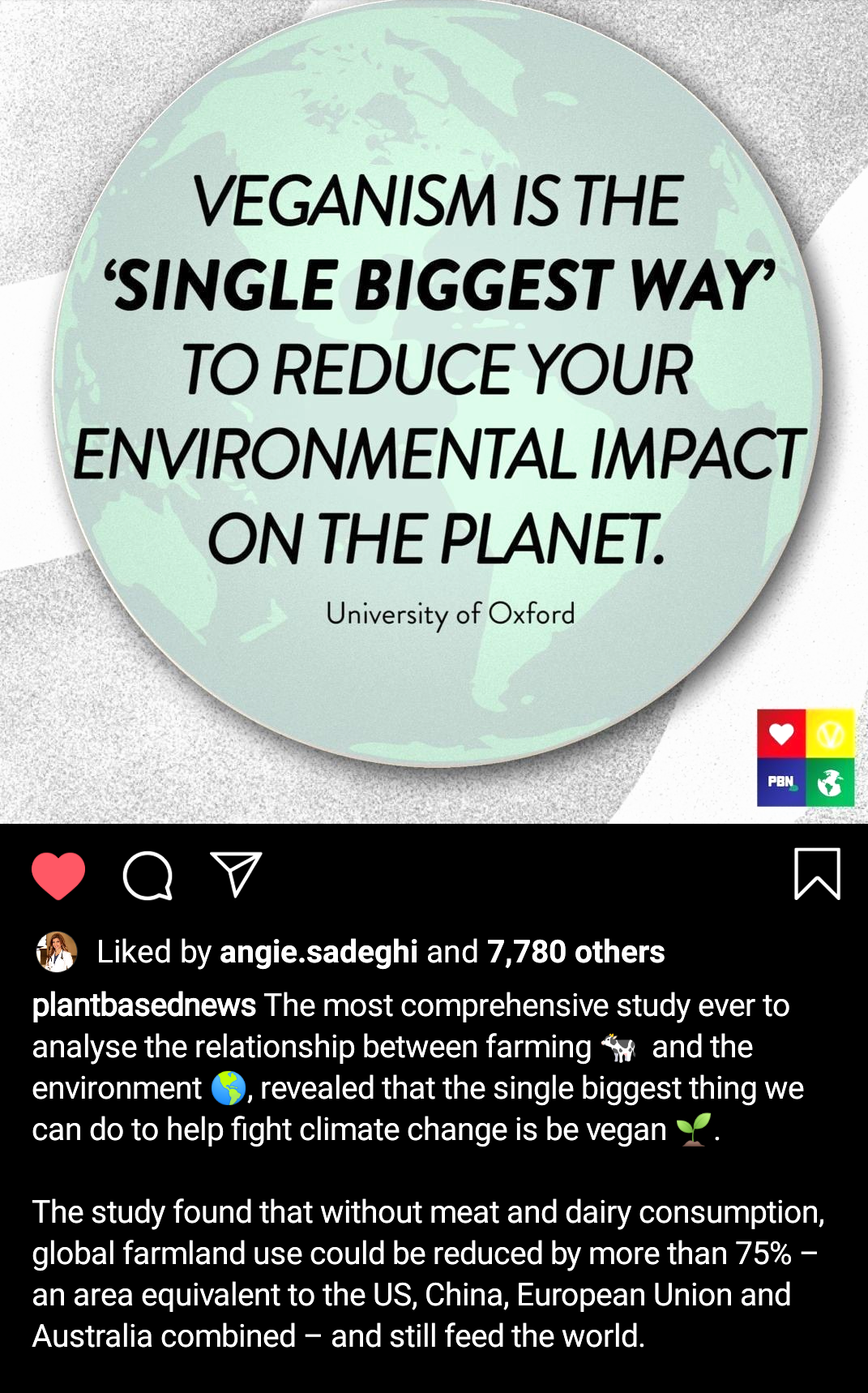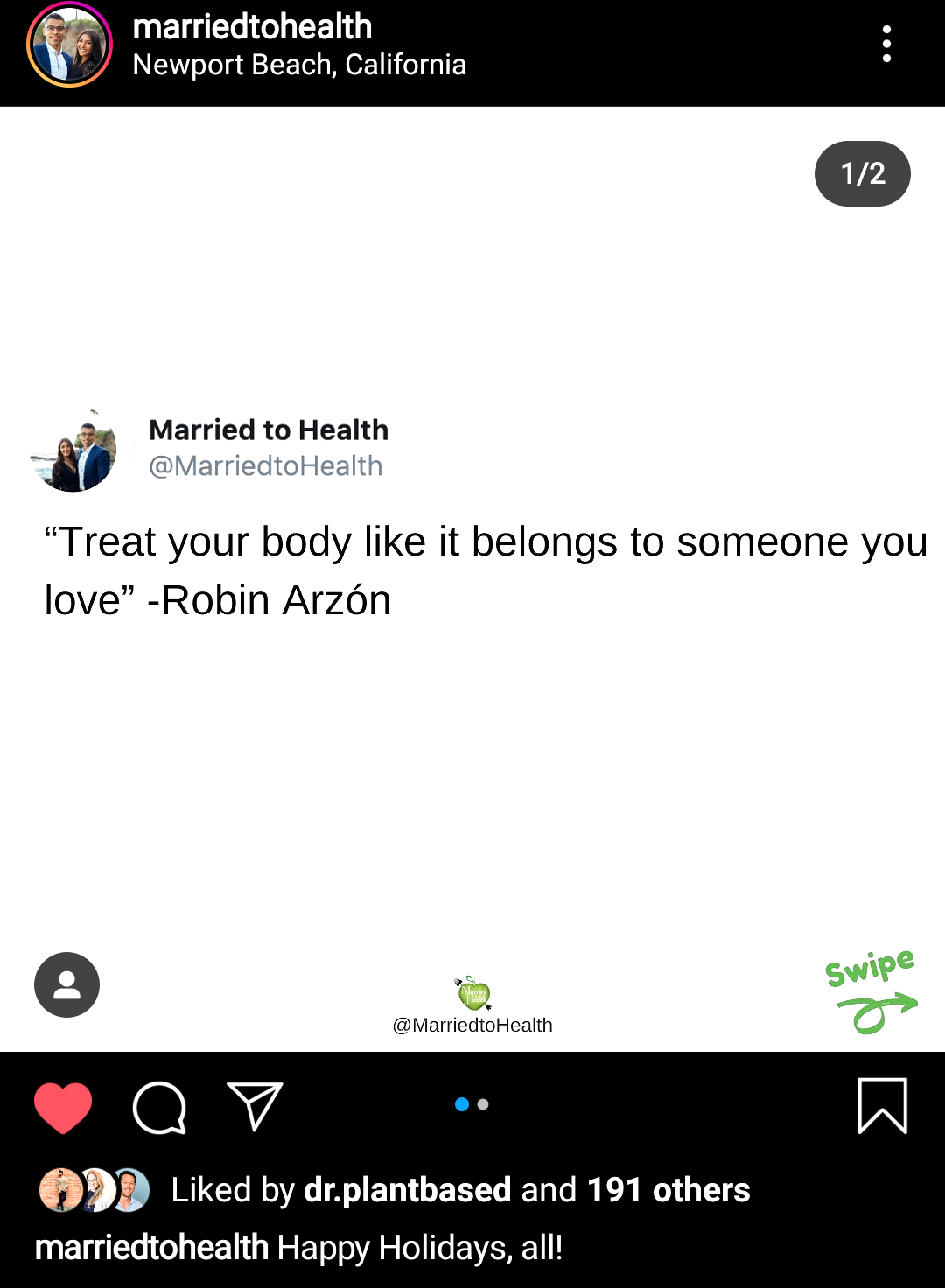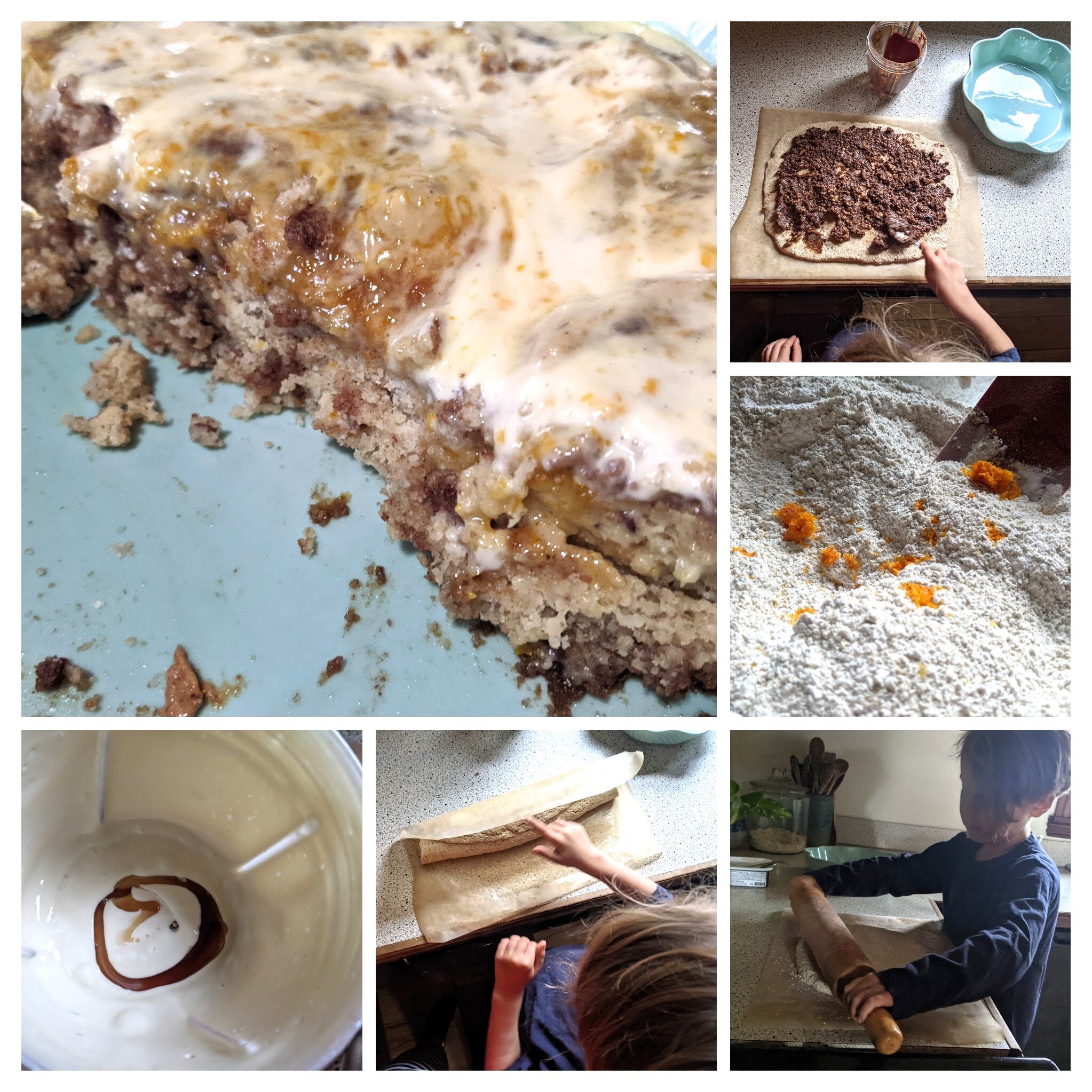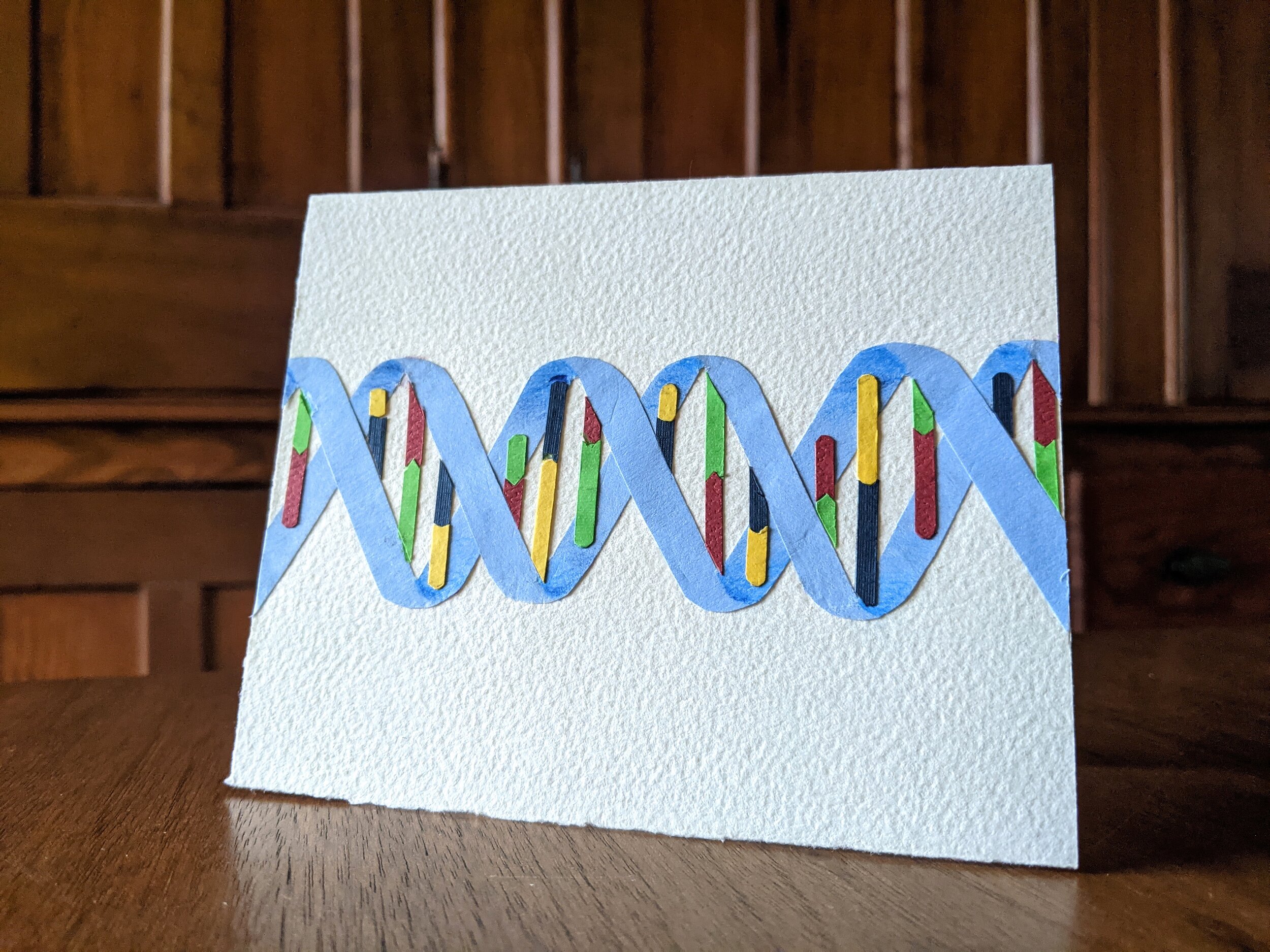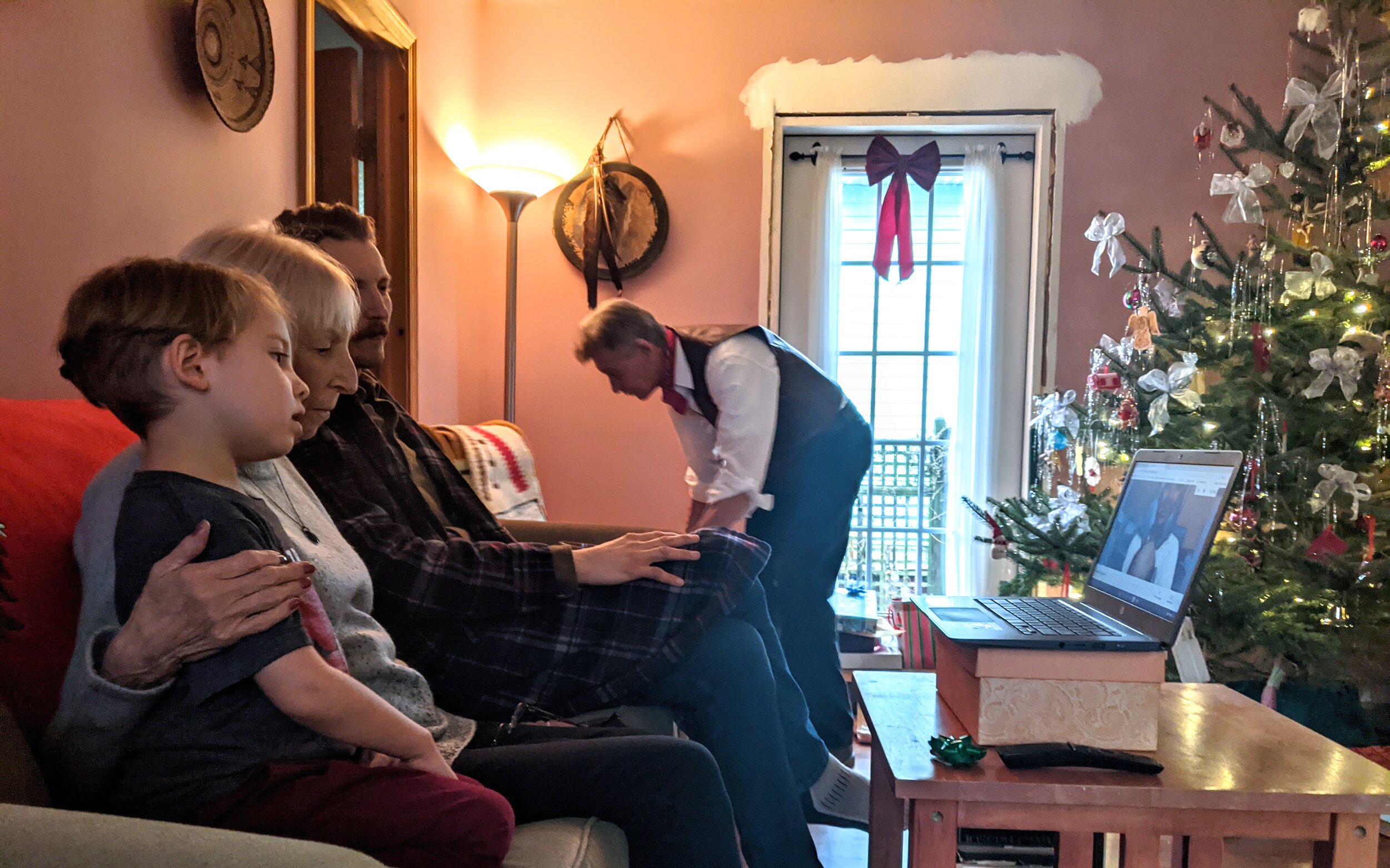Sunday Song Day: Scrooge Songs, Cappello Christmas 2020 (Love Notes in Various Forms)
Because Scrooge appears thematically almost as much as the Christian roots and/or Santa in Christmas (Movie) Classics, Q took note of the frequency and asked why, and Ian reply-explained perfectly with something akin to "There’s that hopeful aspect of ‘It’s not too late. There’s still time!’”
That cord of redemption and growth became a mental Christmas Clang through this altered holiday season and frankly this whole year (<—as Ian and I stress-laughed over the discord of “There’s still time! / WE’RE RUNNING OUT OF TIME!”)
I hark this passionate environmental/nutritional klaxon because we are sprinting past climate tipping points while the United Nations has been howling for years, “At the individual level, we need to change our eating habits. Every decision we make at the grocery store sends a message to food manufacturers. Animal agriculture puts a lot of stress on the environment, using many natural resources and producing large amounts of methane, an extremely potent greenhouse gas. A shift toward plant-based diets is one of the most significant ways to reduce greenhouse gases from the agriculture sector.”
I continue to holler because in the same realm of “Anyone can change!” I once spent my holidays stuffing myself with another animal’s flesh, breastmilk, and ovulation and loving (& vehemently defending) every second of it; but then I started actually looking into the environmental, nutritional, and compassionate affects of all of those “delights” and realized if I actually listened to our leading organizations and doctors: our family could simultaneously nutritionally thrive, spare another soul from suffering, and we’d create the biggest individual environmental impact (<— for less money than the traditional American diet).
It was the best decision we ever made (healthfully, environmentally, mentally, heartfully :-D ), there is endless research supporting why (<—You even have Oxford <—will go over that study within), and all we can wonder is: why would anyone continue status quo given all the warnings to stop/decrease? There’s unnecessary cruelty & destruction (<—environmentally, bodily) on one end (<—purely for taste), health/compassion/reparation on the other.
And we most unfortunately no longer have the comfortable luxury of “There’s time!” The time for waking up and shifting plant-based is now, because given the writing on the wall for our children and theirs: I can’t imagine what worse ghost needs to visit to propel humanity toward a merry and bright tomorrow; and I mean that truly, because plant-based feasting is delicious, tied to better health, and comes with vast environmental bettering.
It’s quite the gift to one and all, eh?
Continue for: Oxford “Plant-based foods are good for both health and the environment”; two Dietitians we follow and adore (one focuses on Pediatric Nutrition, the other on Diabetes); Scrooge Songs of Change & Cappello Christmas 2020.
Live Kindly, Feast Kindly, Grow Forward.
Lead author Dr Michael Clark, of the Livestock, Environment and People (LEAP) project at the Oxford Martin School, and the Nuffield Department of Population Health, University of Oxford, says the findings could help consumers make better choices by equipping them with an understanding of the health and environmental impacts of different foods, and enable policymakers to issue more effective dietary guidelines.
'Diets are a leading source of poor health and environmental harm,' said Dr Clark. 'Continuing to eat the way we do threatens societies, through chronic ill health and degradation of Earth’s climate, ecosystems, and water resources.
'Choosing better, more sustainable diets is one of the main ways people can improve their health and help protect the environment. How and where a food is produced also affects its environmental impact, but to a much smaller extent than food choice.'
Using a comparison of an additional serving per day of 15 different foods, the researchers analysed collections of large epidemiological cohort studies—which follow populations of individuals through time— and life cycle assessments—which are used to estimate the environmental impacts per unit of food produced. The health and environmental analyses each incorporated five outcomes (total mortality, heart disease, stroke, type II diabetes, and colorectal cancer for health; and greenhouse gas emissions, land use, water use, water pollution, and acidification potential for environment), and the results were consistent when applied across nearly all combinations of health and environmental outcomes.
'The study adds to the growing body of evidence that stresses that replacing meat and dairy with a variety of plant-based foods can improve both your health and the health of the planet,' said co-author Dr Marco Springmann, of the LEAP project and Oxford’s Nuffield Department of Population Health.
The full paper, 'Multiple health and environmental impacts of foods,' is published in the Proceedings of the National Academy of Sciences.
Since this has been published, we’ve passed some tipping points and worse ones are yet to come.
Taste/old-habits are the leading cause of this environmental destruction (<—emissions, water pollution/waste, land degradation/waste), the leading cause of death world-wide, and compounding damage past our ability to fix…yet you have our leading organizations saying: THERE IS SOMETHING YOU CAN DO!
There is not a second to waste on wailing about how bad things were are could be if there isn’t a solution, and luckily for all of us the solution as is healthful as it is impactful: transitioning as plant-based as possible.
Dietitians James and Dahlia Marin are another beautiful example of souls who were raised with the foods we all love(d), were swimming in their own feast of chronic/preventable diseases, learned about plant-based nutrition in college, transformed their own health beyond their hypotheses, and have now dedicated their lives to healing as many souls as they can. Dahlia is the focus of a favorite podcast “Understanding Your Gut And Raising Healthy Children With Dahlia Marin” (<—so helpful if you have kiddos and have questions on how best to feed them!) and James has another great one titled “Bettering Your Health With Environmental Nutrition” which includes some mind-opening insights on how Type 2 diabetes starts and how to STOP IT.
So how did we “treat” ourselves while keeping it as healthy as possible? We made some from-scratch orange cinnamon rolls with our own whole-grain blend (oats, flax, tapioca) mixed with orange zest; made a filling of dates, walnuts, cinnamon, and maple; made a glaze out of the reduced orange juice from the ones zested; and made a Maple Miyoko’s (cashew) cream cheese frosting to slather on top. :-)
You can still have Christmas food-fun in the plant-based realm, and still get that baking-with-the-kiddo joy too. <3
And our general tradition is to make each other cards. We had to cut back on Christmas card distribution by 2/3’s this year because time/money didn’t allow for more, and Q took the last one and made us a family drawing for Christmas. <3
And Ian’s cards are always little heart-swooning masterpieces.
Nerdy love notes. I truly don’t think there is a day that passes in this house without a discussion of frequencies and wavelengths in some vector (color, music, light, space, etc) and I simultaneously love that Ian and I can still amble off in multitudinous discussion points, and laugh over the heady dunk-tank Q digests through a meal-time of conversational wanders.
Epigenetics is a big frequent topic and one I suggest we all dive into. Your genes are not your destiny: your diet has the power to control the expression of those genes.
And speaking of balance: our Christmases used to be a whirl of driving to multiple homes and by the end of the season we were a fried, over-spent crisp. The serenity of having Christmas at home this year was a treasured joy.
Though at a physical distance, that tree was surrounded by gifts from friends, neighbors, and relatives for Q and it was good for the heart to have him ask (and read out) the origin of each gift followed by a, “Ooh! We’ll have to thank them.”
And in the peace of a free morning, we headed out into the rain and were gifted the sight of finally seeing the Rand waterfall flowing! <3 (<—-Have been coming here for years and always catch it on dry spells.)
Love Notes (in gift form and appreciation): my father apparently took note that in all the photos of Ian with a walking stick (<—one Ian borrowed from his father long ago) that it was too short for Ian’s height, and he found this great stick for him.
It was out in the forest supporting Ian and Q through a rainy hike within an hour after getting it, and we appreciated the sweet thought as much as we loved this rare beautiful view. <3
Love Note: heart-bound soul-mates.
The one constant through Christmas was Grandma and Grandpa who live across the street and are the only 2 souls we see sans masks (<—because meals and movies are shared with Grandma each week). Q was able to read Christmas Eve books with her, and open up gifts with them the following day.
2020: Zoom calls with far-flung relatives, kept apart by closed borders.
And the positive upswing of this 2020 whirl: South Onondaga did its first Christmas parade as a way to boost spirits. <3
When they looped back, I caught this shot.
From across the house we heard Q bellow, “They’re back! And there’s goats! Who knew there’d be goats?! One of them just looked at me SQUARE in the EYE! This is the best Christmas EVER!!!” :-D
Biggest Christmas Heart-Pull/Swell: Opa gifted Q a plaster treasure chest where you could chisel out some plastic gems, and later Q said, “I think my favorite gift is the treasure chest from Opa, because if I can find that treasure then we won’t have to worry about money anymore!”
His Christmas wish for next year, “That everyone we love becomes plant-based this year, because we love a lot of people and if they all went plant-based we’d REALLY make a big environmental impact!”
His heart is a big lump of sweetness and Boy Howdy do we love him dearly.
Want some bright morning light Scrooge songs? Here’s some that have been rattling around in this realm.
“Thankful Heart” - Muppet Christmas Carol
Stop and look around you, the glory that you see
Is born again each day, don't let is slip away
How precious life can be
”Put A Little Love in Your Heart” - Scrooged
You see it's getting late
Oh, please don't hesitate
Put a little love in your heart
And the world will be a better place
And the world will be a better place
For you and me
You just wait and see
How are we over here using those hands and hearts to right the damage of our past? Crystal and I spent all Saturday doing a test-run for next week’s Your Kind Kitchen launch (which thankfully stuffed our fridge with plant-based feasting for the week), and sweet Ian worked away on the initial cleaning of the zero-waste containers.
What’s the most impactful thing you can do as an individual to help your kin, community, millions of species, and planet? Transition as plant-based as possible.🌎♥️
Why? Plant-Based foods are environmentally imperative 🌎. They also promote ideal health💪 (which takes stress off our overburdened health care system), are inexpensive🙌, delicious🤤, & compassionate. 💕
Why imperative, though? 🤔We’re approaching (& have crossed) climate tipping points that will doom our kin & millions of other species. 😱📣Reducing/eliminating animal products is the *most impactful thing an individual can do* to prevent worse. 🌎🔥
Why? Animal Agriculture creates more emissions than the entire transportation sector combined, it’s tied to water waste/loss/pollution (<-- freshwater is our most precious resource💧), land loss/deforestation (<-- exacerbates climate change by reducing our ability to sequester carbon🔥🌎), ocean acidification (<-- FYI 50-85% of earth’s oxygen originates from oceanic plankton🌊) & vast species loss/extinction/suffering💔📣🌎
Plus, consuming animal products is tied to increased risk of cardiovascular disease❤️🩹, diabetes👎, cancer👎, and chronic disease👎; whereas Plant-Based feasting is linked to preventing/reversing some of our most common diseases (<— like cardiovascular disease, diabetes, and cancer); plus it promotes ideal health & robust strength (ie Olympians, Weightlifters, Endurance Athletes are thriving via PBWFs too). 🎉🙌♥️
What organizations are promoting plant-based diets for best health and environmental stability? National Institutes of Health, Mayo Clinic, Yale, the United Nations, Harvard School of Health, American Heart Association, American College of Cardiology, American Cancer Society, American Diabetes Association, The American Academy of Pediatrics, National Kidney Foundation, even the Parkinson’s Foundation.
We’re all overwhelmed in one way or another, but for the sake of our kin (and the millions of species we share this planet with) we need to start pivoting forward. As someone who once rarely ate green things & used to eat animal products at every meal, I can assure you that is possible, affordable, enjoyable, & purposeful to pivot Plant-Based. In fact, our whole family is now healthier/stronger than ever. 🙌♥️
Anecdotally, our son had failure-to-thrive, was also plagued with perpetual ear-infections/sinus-infections, and had an omnipresent runny nose. What was he eating? Grass-fed milk, organic/antibiotic-free/grass-fed/local meats, eggs from organic-fed/well-loved chickens from a neighbor, every meal came with vegetables, and we limited junkfood. He was healed via a plant-based diet: he’s launched out of that diagnosis and the last time he had a sinus-infection (or was sick at all) was in 2019 when he had some cheese at a school Christmas party. Before shifting to PBWF’s he was sick every month, and how he’s a robust, vital, thriving kiddo. 🙌🎉♥️
If you think any of the above sounds over-reached/absurd/impossible, please go read the links above. I understand the inclination to hackle-raise (<—because I was once totally there) but the science is clear: any step we make forward is imperative (<—and again “STEPS” is the focus. Don’t leap, just start making steps!). It’s as simple as starting with one meal a week and growing from there.💕
We have the ability (deliciously, healthfully, kindly, inexpensively) to *preserve/protect* the planet we share with millions of species & our kin. How are we going to use that power today?✌️🤟🖖

